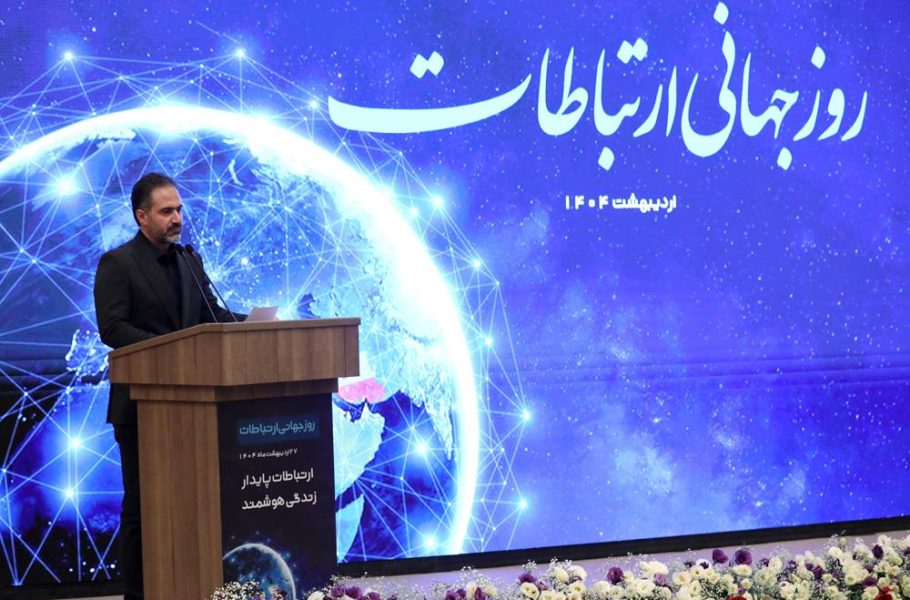
Four Proposals from Golrang’s Digital Transformation Deputy to Boost Iran’s Digital Economy
The Deputy of Digital Transformation at Golrang Industrial Group spoke about empowering the private sector to transform Iran’s digital economy.
The Deputy of Technology and Digital Transformation at Golrang Industrial Group spoke at the Communications Day ceremony, in the presence of Iran’s President and Minister of Communications, about empowering the private sector to transform Iran’s digital economy with a focus on artificial intelligence.
According to Digiato, Alireza Kianpour, during the inauguration ceremony of projects in the communications and information technology sector, stated that the digital revolution is reshaping global economies and that Iran stands at a turning point. He said, “By strengthening collaboration between the government and the private sector, technological advancements can be transformed into economic opportunities, leveraging the remaining window of opportunity and the power of technology to address some of the country’s developmental gaps. If oil was the enabling economic factor in past decades, today technology is a fundamental commodity and a transformative force in the economies of nations.”
To increase the share of digital technologies in Iran’s GDP, Kianpour presented four proposals to President Masoud Pezeshkian and Minister Sattar Hashemi. “The first proposal is to transform technology into an opportunity for economic development. If we examine developed countries, we see that major technology companies directly or indirectly contribute significantly to their GDP. In Iran, large technology companies have the potential to create similar transformative waves, albeit on a smaller scale.”
Kianpour emphasized, “However, this requires government support to turn technology into economic opportunities and to shift away from a security-centric view of these businesses. Additionally, in international agreements, the role of AI technologies should be prioritized alongside other critical sectors like energy, aviation, and rail transport, particularly within frameworks like BRICS or regional treaties. Iranian technology companies need to benefit from the government’s diplomatic support and play an active role in the government’s proactive foreign diplomacy, as we have seen in recent developments in neighboring countries.”
Private Sector Confused by Multiple Regulatory Bodies
He cited “streamlining regulation and policymaking in the field of artificial intelligence” as his second proposal, adding, “The multiplicity of regulatory bodies in the AI sector has created confusion for the private sector and its stakeholders. The government should consolidate these efforts under a single entity.”
According to the Deputy of Technology and Digital Transformation at Golrang Industrial Group, “Instead of numerous councils, centers, authorities, and various high-level documents—some of which carry the ‘national’ label—the country needs transparent, knowledge-based regulation. Furthermore, the government’s role is not to compete with the private sector in developing AI platforms but to empower and facilitate their creation by the private sector and universities.”
Kianpour highlighted that this includes financial and tax incentives for private companies active in AI research and development, adding, “We must also address the risks of using large language models like ChatGPT, which pose threats of leaking sensitive information. The private sector can develop secure, culturally aligned, indigenous large language models. The government can support these efforts by providing loans, tax incentives, and access to computational resources.”
Importance of Creating Secure and Integrated Data Infrastructure
“Establishing an integrated data infrastructure” was his third proposal to the President and the Minister of Communications. The CEO of Golrang System explained, “Artificial intelligence depends on data, which can be likened to the lifeblood of AI technology. Without creating and managing a secure, integrated data infrastructure in the country, no governmental or private economic entity can effectively operate in the digital sector.”
Kianpour stressed that the government should lead the creation of this infrastructure and ensure interoperability between public and private systems. He suggested, “The positive step the government has taken in providing services from government organizations through the integrated government services network should be expanded to include lawful and controlled access to the data of these systems. In other words, current access to systems should be upgraded to access to data.”
He further proposed, “One or more data marketplaces should be established—systematic platforms where public and private entities can securely share anonymized data, and data can be traded commercially on these platforms. Creating these marketplaces will be a key factor in strengthening the country’s digital businesses. Additionally, mechanisms should be developed to value and trade digital assets and data in the stock market, transforming data into an economic resource.”
Country Suffers from Shortage of Tech Talent
The Deputy of Technology and Digital Transformation at Golrang Industrial Group named “attracting human capital from abroad” as the fourth proposal to increase the share of digital technologies in GDP, adding, “One of the fundamental challenges in the country is the shortage of tech talent. If we look at the national programs of developing countries in the AI field, we see the unique importance of training and retaining skilled professionals at a national level. While attracting foreign investment can boost the economy, attracting human capital and elites from abroad is even more critical.”
Bringing Back Migrated Elites
Referring to creating a wave of reverse migration for the physical or virtual return of elites who have emigrated in recent years, he proposed, “A platform, in collaboration with the private sector, should be created to facilitate, encourage, and utilize Iranian elites abroad with expertise and experience in digital technology development, enabling their return or remote collaboration. This is feasible, provided the security-centric approach to this issue is resolved.”
Addressing the President, the CEO of Golrang System said, “The flourishing of Iran’s digital economy and increasing its share in GDP to over 15 percent is not a distant dream but an attainable opportunity. By transforming technology development into an economic opportunity for the private sector, creating an integrated data infrastructure, strengthening government-private sector collaboration, and incorporating technology development into the country’s diplomatic agenda, your government can empower Iran’s private sector to align with the AI revolution.”
Kianpour emphasized, “The private sector is ready to act but needs the support and vision of your government.”












